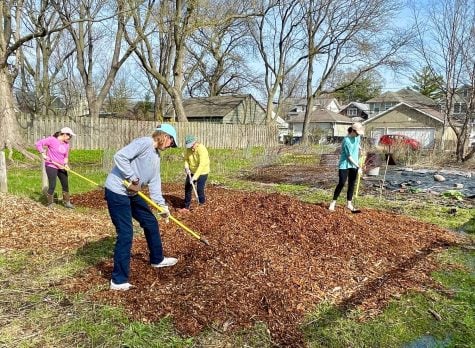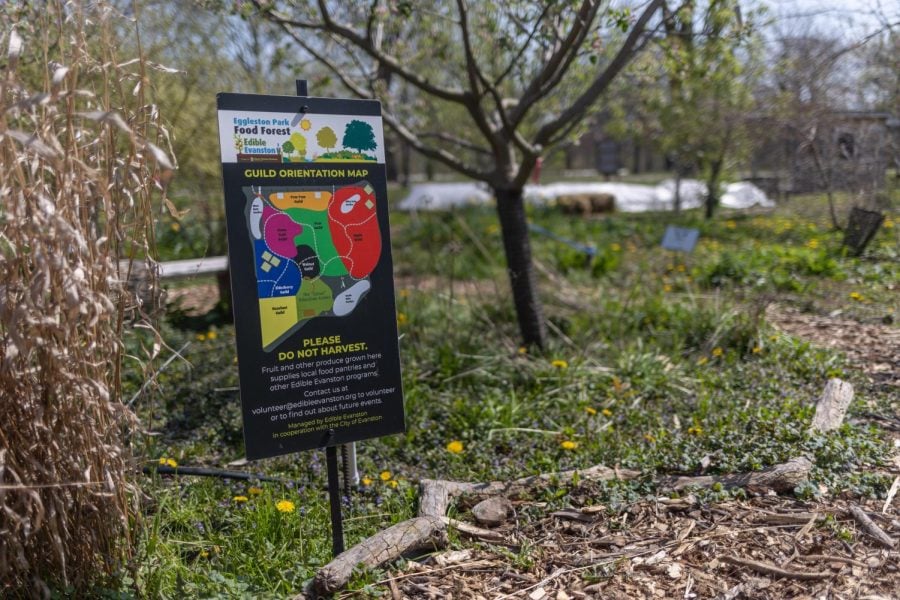Evanston Grows builds a blooming community, combats food injustice through urban gardening
Jorge Melendez/The Daily Northwestern
The Eggleston Park Food Forest. Evanston Grows built raised garden beds and fences in the park last week, providing enough space to grow approximately 2,000 pounds of produce.
May 9, 2022
Left with 1,000 pounds of fresh produce from the Fleetwood-Jourdain Community Center gardens at the start of the pandemic, long-time gardener Jean Fies decided to distribute the leftovers to District 65 families picking up lunches.
The experience made Fies realize the potential Evanston gardens have to combat food insecurity. She reached out to like-minded organizations and residents in a collaborative effort that eventually evolved into Evanston Grows, for which she is the board president.
Founded in April 2021, Evanston Grows aims to fight food injustice through urban gardening alongside a board, contracted workers and a network of community growing groups, including Curt’s Café and Edible Evanston.
“We decided that the best structure would be a collective,” Fies said. “(This structure) could help support the groups’ ongoing efforts and create new projects together that would even more significantly address food insecurity and health equity.”
Evanston Grows works with multiple partnership gardens — a range of revitalized sites, newly built spaces, land owned by the city and private property. Group members, local neighbors and community volunteers maintain the gardens through a joint effort.
While some of the harvested produce goes to neighbors, Evanston Grows also has a farmstand that distributes free produce every Wednesday at Fleetwood-Jourdain. The collective plans to open another stand this summer in South Evanston at 300 Dodge Ave.
Evanston Grows coordinates with the city and District 65 social workers, who identify and contact residents who may struggle with food insecurity to share the pickup locations with them. Fies said the weekly produce bag pickups from the farmstand fulfill produce needs throughout the 20-week growing season.
“We’re leaning heavily on the city to communicate with the community centers and identify residents struggling with food insecurity,” Fies said. “We don’t know who they are — our job is to harvest, package and put it out.”
Fies said Evanston Grows has presented at two city ward meetings and plans to attend all nine, with the aim to find new spaces for gardens, encourage donations and spread the word about the community effort.
Last week, Evanston Grows’ members built raised garden beds and fences in Eggleston Park, providing enough space to grow an estimated 2,000 pounds of produce. According to
Fies, more than 30 individuals volunteered, including students from Evanston Township Highschool, Loyola University and Northwestern.
“It really was an amazing collaborative effort,” Fies said. “Together we’ll plant, grow, harvest, distribute amongst neighbors, and we’ll also put extra produce from there in the community fridges.”

Fies said the community impact is undeniable.
Last spring, Evanston Grows worked with the affordable housing complex Emerson Square Apartments to revitalize their garden beds. Residents came together to weed, water and harvest a range of produce: tomatoes, cucumbers, romaine lettuce and squash.
Emerson Square resident Denise Johnson said the gardens have helped her create new friendships with her neighbors, introduced more greens to her diet and cut down her grocery bill — especially important due to inflationary prices.
“I never had anything to do with gardening before,” Johnson said, “But now I just love it — learning how to grow plants (and) vegetables and take care of them.””
Mary Collins, director of strategy for Evanston Grows, said remaining hyperlocal and forming community partnerships is essential to the group’s viability and impact.
Fies said she is writing a grant alongside Evanston Public Library staff to install hydroponic gardens in the library to grow space-efficient produce without soil. She said the collective has also partnered with Evanston Fight for Black Lives to develop the West End Garden in Adam Perry Park.
“We want to develop opportunities and make space for people in the neighborhoods adjacent to the gardens to be able to participate,” Collins said.
Collins added that since the gardens are in a semi-dense urban area, Evanston Grows must be mindful of public interaction with the gardens as a place for recreation.
While Evanston Grows is still navigating its relationship with the community, Johnson said access to fresh produce has made cooking much more convenient.
“If I need something for a salad,” said Johnson, “I just run out and grab romaine or a cherry tomato from the garden.”
Email: [email protected]
Twitter: @haleyhandelman
Related Stories:
— ‘Grasping things at the root:’ Abolition activism grows at West End Garden
— EPL, other community resources expanded as a result of the pandemic
— Evanston organizations work to fight food insecurity, foster community during pandemic


